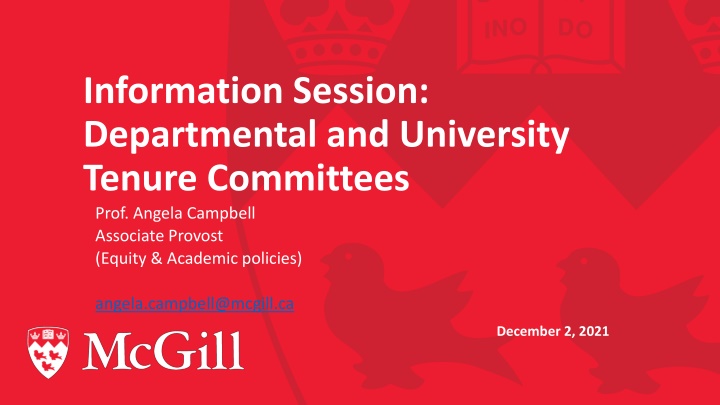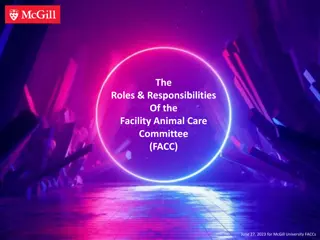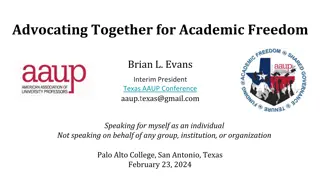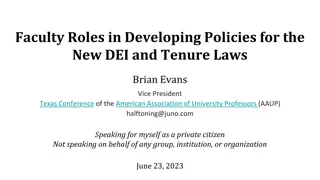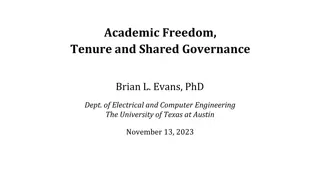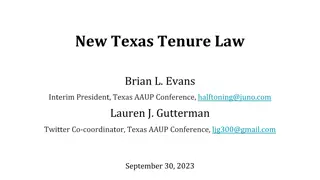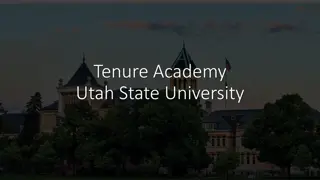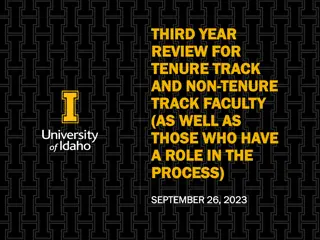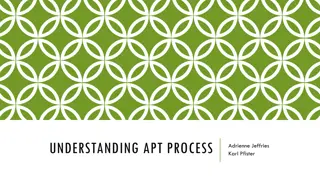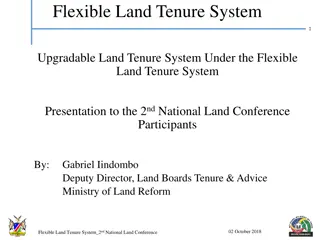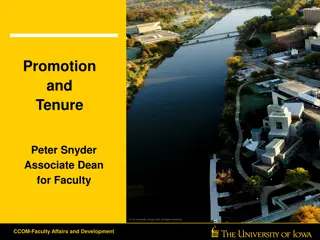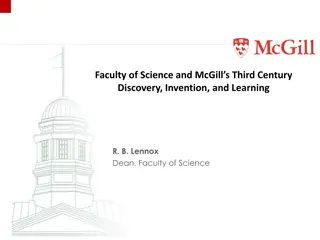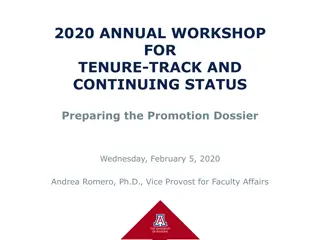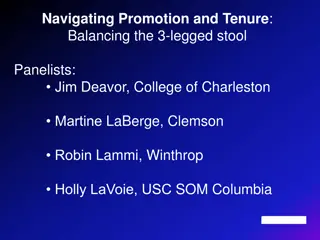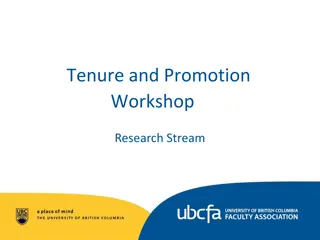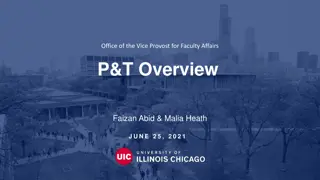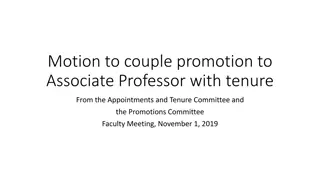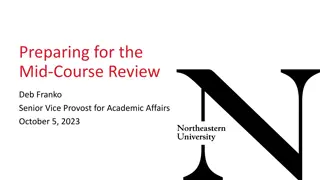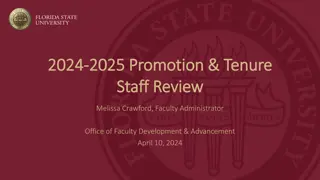McGill University Tenure Regulations
This information session delves into the tenure regulations at McGill University, covering the process, committees involved, timing considerations for tenure consideration, and options for delayed consideration. Detailed information on levels of review, successful tenure candidates, and regulations relating to tenure track and tenured staff is provided.
Download Presentation

Please find below an Image/Link to download the presentation.
The content on the website is provided AS IS for your information and personal use only. It may not be sold, licensed, or shared on other websites without obtaining consent from the author.If you encounter any issues during the download, it is possible that the publisher has removed the file from their server.
You are allowed to download the files provided on this website for personal or commercial use, subject to the condition that they are used lawfully. All files are the property of their respective owners.
The content on the website is provided AS IS for your information and personal use only. It may not be sold, licensed, or shared on other websites without obtaining consent from the author.
E N D
Presentation Transcript
Information Session: Departmental and University Tenure Committees Prof. Angela Campbell Associate Provost (Equity & Academic policies) angela.campbell@mcgill.ca December 2, 2021
Tenure at McGill Regulations Relating to the Employment of Tenure Track andTenured Academic Staff Regulations Relating to the Employment of Librarian Staff available from the Secretariat website: https://www.mcgill.ca/secretariat/policies-and- regulations 1
Tenure at McGill Tenure Candidates: 2011-2021 715 Total # of Candidates Number of successful candidates (ie., who did not withdraw from process or tenure denied) 671 94% Success rate 2
Levels of Review 1. DTC/LTC Departmental/Library Tenure Committee, usually chaired by Department Chair, plus at least 4 other members 2. UTC University tenure committee, chaired by Dean, plus 5 other members 3. Principal or delegate (Provost) For information on the composition of internal committees, including for candidates with joint appointments, please consult the Regulations. 3
Timing of Tenure Consideration Mandatory consideration (from year of initial appointment): Assistant Professor/Librarian: 6th year Associate Professor/Librarian: 5th year Full Professor/Librarian: 4th year Early consideration: Assistant Professor: from 3rd year (Chair may initiate the process in any year with Candidate s consent) Associate or Full Professor: any year 4
Timing of Tenure Consideration (con t) Delayed consideration: 1. A faculty member may elect to exclude authorized leaves of longer than 3 months as service for tenure consideration. Result: placement in following year s tenure cohort. 2. A faculty member may also elect to defer their tenure consideration by one year on account of the impact of COVID-19 on academic performance and productivity. 5
Timing of Tenure Consideration (con t) Delayed consideration (con t): 3. In either or both of cases (1) or (2) above, the election must be communicated to Provost s office in writing no later than June 1st of normal year of tenure consideration. 4. Maximum of 2 non-COVID extensions permitted as well as 1 COVID-related extension (note: this includes extensions related to leaves pre-reappointment). 6
Academic Duties PROFESSORS LIBRARIANS Teaching Position Responsibilities Research Professional and Scholarly Activities Other Contributions (Service) Other Contributions (Service) Minimum Assessment for Tenure Superior performance in two categories (NB: for librarians, one of two Superior assessments must be for Position Responsibilities) Reasonable performance in the third 7
Relevant Period and Content Remember to focus on performance, not promise. The period assessed includes all years up to the year of tenure consideration during tenure-track period, rather than before. (Exception: early tenure candidates) How to avoid double counting of achievements. The candidate s dossier is what matters no one else s; the tenure analysis is not comparative. 8
The Tenure Dossier as Prepared by the Candidate Curriculum vitae Personal statement (outlining your performance of academic duties) Record of research, scholarship, professional activities and contributions Record of teaching (note TLS support) Record of general contributions to University and scholarly communities Other materials the Candidate may wish to submit 9
The Tenure Dossier: Guidance for the Candidate and their Committees o Guidelines for Developing a Teaching Portfolio o Guidelines for Developing a Research Portfolio o Guidelines for Developing a Service Portfolio** These are Appendices A, B, and C respectively of the Regulations Relating to the Employment of Tenure Track and Tenured Academic Staff Examples of the Range of Research Accomplishments, Recognition and Impacts Valued at McGill ** Informal service work is valued at McGill 10
Academic Performance in the COVID-19 context COVID-19 has affected members of the academic staff in different ways. Working with MAUT, McGill has developed measures that seek to ensure the equitable assessment of all academic staff recognizing the potential adverse effects of the pandemic on performance and productivity. See: Guidelines for Assessing COVID-19 s Impact on the Assessment of Academic Performance: In all situations where their academic performance is assessed, academic staff shall be given a meaningful opportunity to explain how COVID-19 affected their work whether in nature, scope, or pace. This opportunity to explain the pandemic s impact on work responsibilities shall take the following form of a one-page submission where academic staff may explain how COVID-19 exerted an impact on performance/productivity. Chairs and Directors (or Deans in the case of Faculties without Departments) will encourage academic staff members to avail themselves of this opportunity. 11
Academic Performance in the COVID-19 context o One-page submission for: o Annual activity reports/merit exercise o Reappointment o Tenure o Promotion o COVID-19 tenure deferral is an option for all faculty members. o See: o Guidelines for Assessing COVID-19 s Impact on Assessment of Academic Performance (2021) o Report of the Micro Task Force to Address COVID-19's Impact on Assessments of Academic Performance (2021) 12
The Tenure Dossier: Additional Items Added to tenure dossier after Sept 1st: External Evaluator reports (3) Items added by DTC Chair (pre-Nov. 15) (if any) Items added by Candidate (pre-Nov. 15) (if any) New material, if requested by DTC, UTC or the Principal (or delegate) to clarify an issue that has arisen during deliberations (post-Nov. 15) 13
External Evaluators Evaluate the Candidate s research and scholarship Must be of recognized standing and qualified to provide an evaluation Must not be in a conflict of interest (e.g., supervisors, professional or close personal relations, recent colleagues/collaborators) Must not be employed by McGill University 14
Responsibilities of the DTC and UTC Be guided by objectivity, equity, integrity, and impartiality (NB COIs and the role of mentors on DTCs and UTCs) Make recommendations based solely on the the performance of the candidate s academic duties as set out in the tenure dossier no benchmarking Whether/when/how to seek additional information Provide substantive reasons to support assessments Avoid COIs (e.g., collaborators, mentors) Respect procedures established by the Regulations, including deadlines 15
Responsibilities of the DTC and UTC Establish effective process for meetings (set two meetings, 2nd may not be needed) Clarity of responsibilities re report-writing including delegation of task and/or minority report if applicable) Ensuring attendance at meeting(s) Ensuring clear correspondence via the Secretariat Preserving anonymity of external evaluations Provision to candidate of fair opportunity to respond to committee concerns for TTN meetings, the Secretariat can provide guidance and letter templates 16
Equity in the Tenure Evaluation Process 1) Understand and reduce unconscious bias: What is it? How can it play out in the tenure assessment process? How can it be reduced? o Taking one s time to read the dossier very carefully o Being mindful of one s bias and setting aside assumptions o Watching for potential bias in evaluation letters/assessments o Paying attention to potential unevenness in opportunities and resources (e.g., mentorship, space, support) and in loads (e.g., teaching and service responsibilities) 17
Equity in the Tenure Evaluation Process 2) Assess all elements of the dossier equitably: The role and place of leaves and career decelerations What counts as valid research: see https://www.mcgill.ca/secretariat/files/secretariat/examples_o f_research_-_final.pdf Recognize and value informal work and contributions, notably those who are members of underrepresented groups (e.g., BIPOC faculty, women faculty notably in STEM fields) Read the dossier carefully: facts matter more than the capacity to self-sell Are student evaluations of courses and teaching biased? 18
Outcomes Tenure is granted (most frequent outcome) appointment for an indefinite term, starting on June 1. If a committee or the Provost is tending to a negative decision the Candidate has the right to: be informed of concerns have access to the substance of external evaluators reports address concerns during an in-person meeting, with an advisor Tenure is denied 37 weeks notice has not been given) and the Candidate may appeal the decision. appointments may continue for up to a year (if 20
Some Tips for Candidates o Seek out advice and consult with colleagues and your mentor(s). NEW Provost s Faculty Mentorship Network (write to equity.provost@mcgill.ca for info). o Ask a trusted colleague or two (but not anyone who ll serve on your tenure committees) to review and provide feedback on your draft dossier. o Keep your cv up-to-date and file all materials/documents that demonstrate your excellence as a teacher, researcher, and member of the McGill and wider academic communities. o Make sure to put your best foot forward in your dossier this is not the time to undersell yourself! Document and explain all you have done and accomplished, including the things that might not be formal and visible (e.g., time spent coaching and mentoring students and trainees, support you ve given colleagues, your students accomplishments to which you have contributed, funding applications that you applied for but were not successful, impacts of your scholarship both within and beyond the academy, e.g., in community sectors). o Explain any extenuating circumstances such as delays in setting up a lab. 21
Further Information and Support Interpretation of the Regulations: angela.campbell@mcgill.ca Timing of tenure: academic.personnel@mcgill.ca Tenure submission deadlines or procedures: bonnie.borenstein@mcgill.ca Teaching Portfolio assembly or questions: tls@mcgill.ca 22
